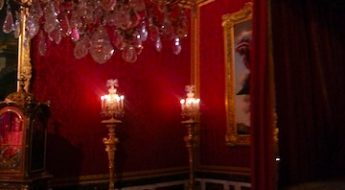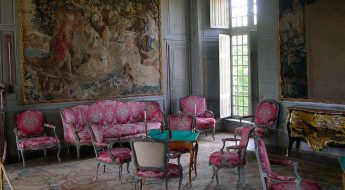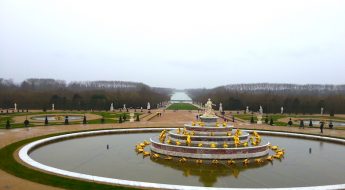Part 5.4 is the final part of Chapter 5.
A Childhood at Versailles consists of the first 5 chapters of the memoirs of Mme de Boigne (1781-1866), née Adèle d’Osmond, who was a French salon hostess and writer. She was born in the Château de Versailles and lived at the court of Louis XVI and Marie-Antoinette until her family fled to England during the Revolution. Later in her long life, she married a rich soldier of fortune 30 years her senior, hosted a brilliant salon in Paris, and became an intimate of the last French queen, Marie-Amélie, consort of King Louis Philippe (r. 1830-1848). Childless herself, Mme de Boigne addressed her memoirs to her grandnephew. The memoirs were not published until 1907, under the title Récits d’une tante, or An Aunt’s Tales. They’ve never been published in English, as far as I know, so I’ve decided to translate the first 5 chapters, the ones that take place mainly at Versailles, and post them here on this blog for interested readers to enjoy for free.
The chapters are quite lengthy, so I’ve broken each one into several parts. In Part 5.4, the author relates her family’s crossing of the Alps in mid-winter on their way to England, where they would remain for many years.
A Childhood at Versailles, Chapter 5, Part 4 (Part 5.4)
I have already spoken several times of my father’s valet, Bermont. When our departure for England was decided, my father wanted to find a place for him in Naples with General Acton. It would have suited him marvellously, but he absolutely refused to hear of it. Several years earlier he had married a woman who had been successively my nursemaid and then my brother’s when I was handed over to an Englishwoman. He had had children with her who were still in France. He told my father that he did not want to be separated from us.
“But, my poor Bermont, I cannot keep a valet.”
“That is true, Monsieur le marquis, but you need a muleteer. You are going to buy some mules for the journey, and someone will be needed to look after them and drive them. Well, that someone will be me.”
My father, moved to tears, could not but accept such devotion. The mules were purchased by Bermont with as much zeal as intelligence. He drove them as coachman and a young negro who had come as a small boy from my father’s plantations served as postillion for a berline that was occupied by my father, my mother, we two children, Bermont’s wife, and a young negress who was particularly attached to my service. I will have occasion to speak of her again.
My father’s resources were not yet completed exhausted. He had decided that he would share the travel costs with Sir John Legard, and from that moment the latter’s head worked incessantly to devise ways to accomplish this journey as cheaply as possible. That was behind the purchase of the mules, crotchety and odious beasts, who gave us a thousand difficulties, and a system of stinginess in every detail that rendered this journey intolerable and sometimes dangerous.
For example, Sir John did not want the carriages to be unhitched, nor to take guides and horses of the country to traverse the the Saint-Gothard pass, and we all thought we would die there. Mounted on a little Neapolitan mule which had never touched or seen snow, I crossed the mountains, led by my poor father sinking into the snow up to his knees at every step, through a frightful storm. I remember that my tears froze on my face. I said nothing in order not to increase the anxiety that I saw painted on my father’s face.
“Hold your bridle, my child.”
“I can’t any more, Papa.”
And, in fact, my leather gloves, first damp and then frozen, had ended up freezing my fingers; I had to rub them with snow. My father wrapped in the jacket of a young man who happened to be there, and we continued on our way. When we arrived at the travellers’ hospice, the weather cleared up a little. Our baggage having been sent ahead to Urseren, we were not able to change out of our wet clothes. My father found Sir John at the door, chatting with a monk who was urging him to stay.
“What do you say, Marquis?”
“To be sure, since the wine has been opened, we must drink it,” said my father.
“Certainly,” replied the candid monk, “certainly, gentlemen, there are already two bottles of it on the table, and if that does not suffice, we have still more.”
This response made me laugh a great deal, and took me out of my suffering. There is such elasticity in the first flush of youth that one quickly regains one’s strength in gaiety. Despite the two bottles ready and waiting, we continued on our way. There was no storm on this side of the mountain. My father talked to me, explaining the avalanches that we saw falling, and the descent seemed as agreeable to me as the ascent had been painful.
We spent a few days in Lausanne, then in Constance, where the old Bishop of Comminges had settled. I spotted Mademoiselle28 from afar. She had just been taken from Mme de Genlis. She did not see anyone, and she was regarded with a kind of repulsion by the whole clique of émigrés who had taken up residence in Constance. After having descended the Rhine by boat, we arrived at Rotterdam. My father went to the Hague to get the trunks that had been left there. We embarked, arrived at Harwich, and immediately set off for Yorkshire.
Notes:
28. Princess Adéläide d’Orléans, born in 1777, daughter of Duke Philippe-Joseph.
This is the end of A Childhood at Versailles. Mme de Boigne’s memoirs go on much longer, but they take us far beyond Versailles. Her adult life belongs to the story of the Napoleonic wars, the Restoration, and the July Monarchy. I will now be looking for a new translation project. Suggestions are welcome!


















Leave a Comment